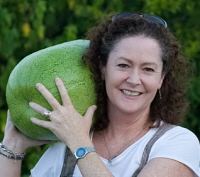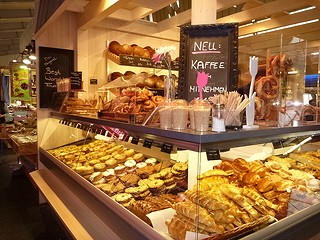Markets of Munich and Frankfurt, Germany
By Ann Shepphird of GardenstoTables.com

Fresh Picks and Catches is a regular column by Ann Shepphird. Ann keeps our readers posted on restaurants and culinary professionals around the world that are at the forefront of bringing the best local, seasonal and environmentally sustainable agriculture, meat and seafood to the table.
*
I’ve always found that one of the best ways to really get to know a city is to visit their fresh food markets. In many cities (especially in the U.S.) that might mean the weekly farmers market but many European cities have markets that are open all year every day but Sunday -- and have been for centuries. On a recent trip to Germany, the open-air Viktualienmarkt market in Munich and Kleinmarkthalle (small market hall) in Frankfurt were a wonderful introduction to the personality of each city, especially when it comes to what they like to eat and drink.
The Viktualienmarkt in Munich
Originally opened in 1807, Munich’s Viktualienmarkt (Viktualien is the Latin word for food) features 140 stalls and shops open Monday through Saturday 10 a.m. - 6 p.m. (with some stalls open until 8 p.m., depending on the weather). The proliferation of bicycles and fresh vegetables -- even in winter -- somewhat belies the city’s reputation for beer and pretzels, although those are found in abundance as well and the Beer and Oktoberfest Museum is just around the corner.

One of the oldest family-owned booths at the Viktualienmarkt is that of the Tretter family, which has been selling vegetables, fruit and wine since 1885. They are best known for their seasonal fresh-squeezed juices, which include fresh asparagus juice in spring and hot apple-cinnamon juice in the winter. If you like honey, Honighausl has been selling more than 60 varieties of honey from more than 20 countries since the 1950s and has a little honey-wine bar inside their shop. Ludwig Freisinger’s Saure Ecke is famous for their olives (more than 20 types), spices and fresh sauerkraut. For Bavarian bread specialties (Munich prides itself on its pretzels), there’s Backerliesl, while Chef Hans Hollweck has a booth of “Rottler delicacies” that include fruit spreads, chutneys and jams.
Special events coming up at the Viktaulienmarkt include a May Pole Celebration on May 4 and Munich Brewer’s Day on June 23, which includes a procession of brewer’s carts accompanied by a brass band and Schaffler dancers. And, naturally, because it’s Munich, there’s a beer garden in the middle of the market -- especially appropriate this year as the city is celebrating 200 years of beer gardens with a series of events.
The Kleinmarkthalle in Frankfurt
It can be said that as Munich is to beer, Frankfurt is to wine -- with the Rheingau wine region just 30 minutes away and the city’s traditional apple wine still served in taverns in a large blue-gray crockery jug called a “Bembel.” The Kleinmarkthalle is located between Zell, Frankfurt’s major shopping street, and the city’s old town. From Monday to Saturday (8 a.m.-6 p.m.), 63 traders at 156 stalls offer fresh vegetables, fruit, meat, fish, flowers and seeds. Originally built in 1871, the market was destroyed in World War II and rebuilt in 1954.

The first stop for most is Ilsa Schreiber’s sausage stand, one of the permanent staples in the Kleinmarkthalle since its opening in the 1950s. Frau Schreiber is almost always there herself cheerfully preparing and selling sausages that include the Fleischwurst (made of pork and beef) and the Krakauer (from Poland, with bacon and garlic). An alternative sausage vendor is Gref Voelsing, who first started producing their Frankfurt-based beef sausages in 1894.
Frankfurt is known for its “green sauce,” which is made from seven herbs--borage, chervil, cress, parsley, salad burnet, sorrel and chives--and traditionally served over hard-boiled eggs and hot, boiled potatoes. It’s also used on meat and sausages. For those who don’t want to make it themselves, several stalls in the market offer a ready-to-go version. And then, to wash it all down, the terrace of Rollander Hof on the first floor (and in the front of the hall on Saturdays) offers a variety of fine regional wines and a great place to sit and take in the sights and smells of the city.
And, again, isn’t that really the best way to really get to know a city?
Photos: By Ann Shepphird
|

